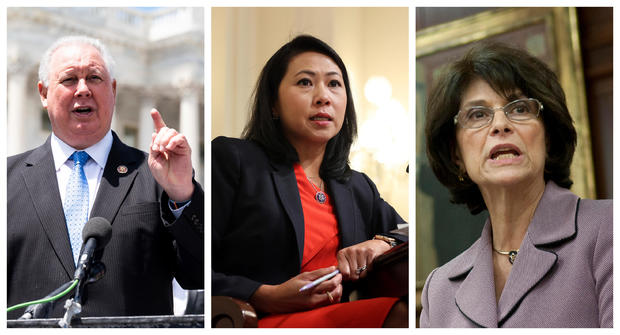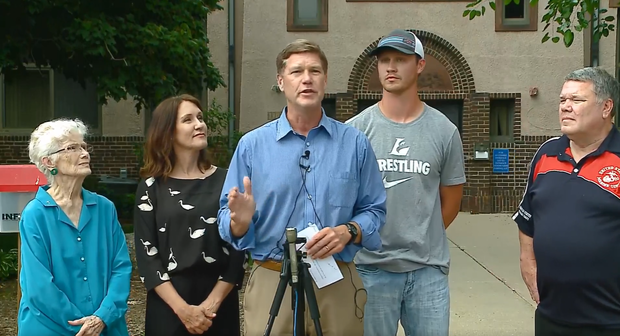Just this week, three House Democrats announced they won’t seek reelection in 2022: New Jersey’s Albio Sires, Florida’s Stephanie Murphy and California’s Lucille Roybal-Allard. That makes 23 House Democrats who have announced they’re retiring or running for another office next year, as the party braces for the possible loss of its already slim majority in the House in next year’s midterm elections.
By comparison, just 11 House Republicans have said they’re not coming back after their 2020 term ends. Two members, Steve Stivers of Ohio and Devin Nunes of California, resigned before the end of their term to take new jobs elsewhere.
It bears noting that just because a majority party has the greater number of vacant seats going into an election, it’s not always the case that it will have a bad year.
For instance, there were 17 seats left open by House Democrats in 2010, compared to 20 on the Republican side, but the Republican Tea Party wave, an anti-tax, small-government movement, flipped the chamber and added 63 new GOP seats.
Republicans also had more open seats going into the 2020 elections, with 35, compared to 12 seats for Democrats. But the GOP still ended up flipping 15 seats, leaving Democrats with a single-digit majority.
But in 1994, there were 31 Democratic seats and 21 Republican seats open; that year, Republicans won the House for the first time since 1952, running on the Reagan-inspired Contract with America, a list of legislation they vowed to pass if they had the majority.
In 2018, Democrats won the chamber from Republicans, who had more than 40 open seats going into the election, compared to 22 for Democrats.
“If you’re a [retiring] Democrat, one of the elements you’re thinking about, is that it may be a bad year,” said former Tennessee House Democrat Bart Gordon, who retired in 2010. “But you don’t go through hard elections and all the fundraising and the time away from your family and just throw up your hands and say, ‘It’s going to be a bad election.’ It’s a combination of a variety of things.”
Democrats are counting other factors going into 2022. They point to redistricting and a new peak in political polarization in Congress, which culminated in the attacks on the Capitol on January 6, as other reasons for the high rate of retirements, which is expected to grow further as more states finish their redistricting process. California’s Grace Napolitano, Georgia’s Sanford Bishop, Tennessee’s Steve Cohen and New Jersey’s Tom Malinowski are all being monitored for potential retirement.
Age and time spent in Congress may also be a consideration. Eleven of the 23 retiring members are over the age of 70 years old, and eleven of them have served in Congress at least 15 years.
“If you’re going to retire now, or you’re going to get out of the game, I think you’re going out on top. I think you’re providing yourself more opportunity to realize that at some point it’s just probably better to go out,” said Los Angeles County Democratic Party Chair Mark Gonzalez.
Redistricting
Stephanie Murphy, a House Democrat who announced her retirement this week, is only 43 years old and has spent five years in Congress. While she won her 2020 reelection by more than 12 points and said she didn’t fear losing her reelection, she was targeted immediately by House Republican groups this cycle– in part because Republicans control the redrawing of her Orlando suburban district.
Six of the 23 members retiring were drawn into districts that either incorporated more Republican voters, worsening their political fortunes, or were pitted against another Democratic incumbent in the same district because their state lost a Congressional seat in the reapportionment dictated by the 2020 Census.
“It’s a surprise for us and disappointing because she’s been a great advocate for us here in Florida, as well as all of her work on the January 6 committee,” Wes Hodge, the Orlando Democratic Party chair, said of Murphy’s retirement. “Republicans will get what they want, there’s no question. So the question is how ugly do they draw this map?
While some retiring Democrats like Cheri Bustos of Illinois or Peter DeFazio of Oregon in fact saw their districts grow more Democratic during redistricting, most of the retiring lawmakers in states that had finished drawing their lines felt they were put in awkward or politically tougher situations.
In North Carolina, G.K. Butterfield saw his Democratic leaning seat become a toss-up district. Roybal-Allard and Lowenthal both announced their retirements right before a final Congressional map revealed that parts of their two Los Angeles-area seats would be combined, setting up a matchup between two Democratic incumbents.
Ron Kind’s Wisconsin seat was unlikely to change much in this round of redistricting. It’s a seat he won by 2 points in 2020.
Frustration with political environment
Former President Trump won Kind’s district by 4.7 points in 2020 and, like Murphy, he was high on the target list for House Republicans. But Kind, who announced his retirement in July, has found his way to win in his rural, western Wisconsin district since he was first elected 26 years ago. While he was confident he could win reelection, he said he was “running out of gas” and was sick of “the toxic political environment.”
“Congress is a reflection of where the American people are. And unfortunately, the American people are very polarized and very divided right now,” he said.
screenshot via Facebook
The 2020 House elections resulted in a record low of 16 split-ticket districts, that is, where a House member’s party affiliation differed from that of the presidential candidate who won the district. A CBS News poll before Virginia’s election for governor in November found voters’ choices were highly motivated by their opposition to the other political party.
Kind declined to predict how House Democrats will do next November, citing the unknown on COVID-19 and the economy. He acknowledged the frustrations with Biden and Capitol Hill Democrats, but said the first years of an administration “are always a challenge.”
“There seems to be a trend here of Republican administrations just making a god awful mess, and then a Democratic president getting elected and then everyone expecting them to have it all solved in six months,” Kind said. “And it just doesn’t work that way.”
While Republicans are using moderate Democrats ‘votes for Biden’s “Build Back Better” plan against them, blaming them for overspending and causing rising inflation, Democrats say their work on the Biden agenda can help them buck the political headwinds going into 2022.
However, that could also backfire, since the president’s social spending plan now appears to be stalled or possibly dead.
“The hardest part for us is how do you sell a Democrat voter on [BBB] if Democrats are not even the ones voting for a Democratic agenda?” Gonzalez said, referencing Senator Joe Manchin of West Virginia, and his hamstringing of Biden’s plan.
Democrats face a real challenge on how to campaign on the national agenda, said Hodge.
“It’s interesting because we’re talking about things like helping poor families to work, to better people’s lives here in America, to work on reforming health care. How are these bad things?” Hodge said.
But Republicans are betting it’s not likely that social spending plans will resonate with voters if in 2022 inflation is still high and COVID-19 surges remain.
“Democrats are living on another planet if they think any piece of legislation is going to make voters forget the skyrocketing inflation, rampant crime and border crisis their policies created,” said National Republican Congressional Committee Communications Director Michael McAdams. “[They] dug themselves a hole they can’t escape so the smart ones are calling it quits while they still can.”
Kind said Democrats running in 2022 have to get away from the disarray on the national stage and keep their campaigns local.
“Congress has been operating under a top-down management for too long,” said Kind, who voted against Nancy Pelosi for Speaker in 2019, but for her in 2021. “My advice to any members operating in a competitive district is they’re best served if you can personalize and localize the election and stay away from the national currents.”
Gordon, a board member for the U.S. Association for the Former Members of Congress, said Democrats in Congress have done a terrible job at explaining to Americans what the infrastructure and social spending bills will do.
“There’s been too much discussion about process. Who cares about what reconciliation is? We’re talking about reconciliation, filibusters, and we’re not talking about how people’s lives are going to be improved,” he said.
Gordon, who retired before the 2010 GOP wave, suggested that while Democrats can run on Biden’s agenda, this may be one of those election cycles when the messaging will fall on deaf ears.
“There comes those periods where folks have their mind made up, just tune out and want a change,” he said.
In keeping with a recent annual tradition, Gordon has invited all the retiring members to his House in January 2022 to get together to talk about transition out of office.
He’s expecting a packed house.

